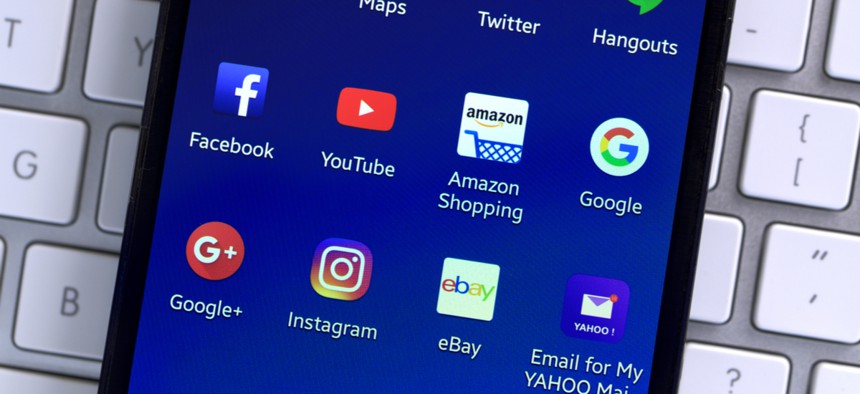The Tiny, Passionate Group Battling Google, Facebook, and Amazon’s Grip on US Minds and Wallets

SUNG YOON JO/Shutterstock.com
The group believes they need to be stopped before they destroy the US economy and democracy itself.
Google, Facebook, and Amazon are controlling Americans’ minds and wallets, and they need to be stopped before they destroy the US economy and democracy itself.
That was the message from a dimly-lit, packed conference room in a nondescript Washington DC hotel near the train station last week. Nearly 200 tech executives, journalists, public relations people, and academics attended the event, organized by the Open Markets Institute, a tiny nonprofit that’s becoming a lightening rod for the growing anger and frustration with Big Tech in America.
The group, headed by former journalist Barry C. Lynn, was unceremoniously ousted (paywall) from Google-funded think tank New America this summer, days after congratulating European regulators on fining Google €2.42 billion in June for abusing its market dominance. Open Markets has landed on its feet, Lynn told Quartz later, thanks to a group of donors and advisors helping the eight-person team spread its message far and wide.
Lynn and his co-panelists delivered a message in DC that was as terrifying as it was absolute—the “Big Three” tech giants need to be cut down to size, immediately. Here are their main points:
They’re destroying our intelligence and humanity: “Very precious things about human life and democratic life are being shredded,” by the dominance of Facebook as a news source, warned Franklin Foer, the author of a damning book on the “existential threat” technology poses, and a writer for The Atlantic (Quartz, like The Atlantic, is owned by Atlantic Media). Human beings are becoming “intellectually incapacitated in the face of fake news and demagoguery,” he warned.
Their dominance makes us desperate: People “feel out of control of their own lives,” said Zephyr Teachout, a Fordham University Law School professor, former candidate for governor of New York, and chair of the institute. That feeling stems from the “society-wide” problem of monopolies in America, she said, and helped to get Donald Trump elected. Facebook, Google, and Amazon have a stranglehold over the “social, commercial, informational, and democratic news community.”
They’re as addictive as opioids, and rotting our kids’ brains: Facebook has created nothing less than a “public health problem” by creating the illusion that we are all surrounded by people who believe the same things we do, said Roger McNamee, the Elevation Partners partner and veteran technology investor.
“We have taken the notion of ‘it if bleeds, it leads’ and married it to the smart phone and individual personal data,” he said, referring to the old tabloid newspaper adage. “What’s different is they have created individual channels for two billion people.”
People are responding to “positive reinforcement on the network” like they do the opioid fentanyl, McNamee said. YouTube’s appeal to kids and Google’s practice of giving away Chrome books to “get children addicted” makes him “terribly concerned” about the impact these companies are having on children. (McNamee’s fears were repeated a day later by Facebook’s first president Sean Parker, who said of the service “God only knows what its doing to our children’s brains.”)
They’re killing competitors and other industries: Many panelists highlighted these companies’ practice of shutting down or buying up fledgling competitors. “These guys are stifling economic activity all over the place,” said McNamee. Breaking up AT&T in the 1982, and threatening Microsoft with a breakup in 2000, “unleashed staggering levels of innovation and economic growth,” he said.
Amazon’s dominance in online book sales, as it moves into publishing and other content creation, was widely panned as an example of how Big Tech is competing with its own customers, and needs government intervention to break it up. “There is nothing inevitable about the concentration of power,” said Lina Khan, the head of legal policy at Open Markets. “We have a rich set of legal tools to address these problems.”
The US’s social media giants are already under fire on Capitol Hill for allowing Russia to weaponize their platforms to meddle in the US election. Amazon’s ruthless price-slashing and non-stop expansion are raising alarms about unfair competition.
So far, however US politicians have been slow to pass serious reforms, and the country’s anti-monopoly regulators appear toothless.
If these companies are ever reined in, Open Markets is likely to have played a key role. While the panelists spoke about monopolies and powerlessness, tens of thousands of people watched from around the world (yes, via Facebook).
Al Franken, the Democratic senator from Minnesota, promised Congress was listening, too, in a keynote speech. For these companies, “we are not their customers, we are their products,” Franken warned. The US government needs to take responsibility to “ensure that these corporations do not endanger our national security, our democracy, or our fundamental freedom,” he said.
Big Tech isn’t Open Markets’ only target, Lynn said in an interview later, just the most important right now. “The Big Three platform is going to be a priority for us because of the size and danger posed by these corporations is of a different magnitude from other corporations,” he said. A decade ago, he said, he spent “a lot of time looking at Walmart,” but “Walmart looks like a gnat compared to Amazon today.”





